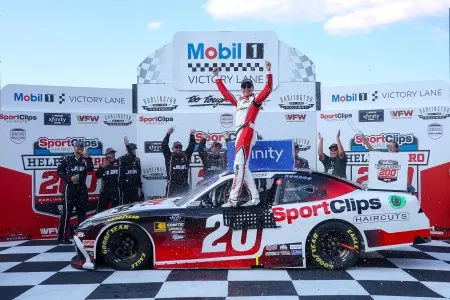
Several NASCAR teams have come forward with accusations of coercion and threats during recent charter negotiations. This revelation has cast a shadow over the ongoing discussions, sparking controversy and raising serious concerns about the sport’s governance and financial stability.
The controversy centers around allegations that teams were forced to sign the charter agreements under duress. According to Jenna Fryer of the Associated Press, teams were allegedly “coerced and threatened” to comply.
This alleged aggressive negotiation tactic has added a layer of tension and unease among the Cup Series teams.
Currently, all teams, with the exception of 23XI Racing and Front Row Motorsports, have signed the charter agreement with NASCAR. The holdouts, namely 23XI Racing—headed by high-profile figures such as Denny Hamlin, Michael Jordan, and Curtis Polk—remain outspoken about their concerns. Front Row Motorsports, also intent on expanding next year, has similarly resisted signing.
The charter system, implemented in 2016, was initially designed to provide stability and secure long-term investments for teams. However, it has faced criticism for its lack of permanency and the financial insecurity it brings. The system’s unequal revenue distribution from media rights continues to be an issue, with only 25% of the revenue going to teams, while 65% goes to the tracks and 10% to NASCAR. This imbalance has long been a source of financial strain for many teams, often resulting in annual losses.
The recent negotiations have taken place against the backdrop of a new media rights deal valued at $7.7 billion, set to run from 2025 to 2031. Partnerships with FOX Sports, NBC, Warner Bros. Discovery, and Amazon promise increased revenue and potential financial relief for the struggling teams. However, the coercive tactics reported during the charter signings have overshadowed this promise.
NASCAR President Steve Phelps has acknowledged the financial challenges faced by teams. In an appearance on Kevin Harvick’s Happy Hour podcast, he admitted to the need for change.
“Something needs to change because if it doesn’t change in my opinion in seven years when we’re re-negotiating the financials of these charters, it’ll come back to we’re not making any money or we’re losing X, Y and Z, and you’ll always be chasing that.”
Phelps also highlighted the vicious cycle where “if there’s more money given, typically what happens is race teams want to take every dollar and then some and spend it to go fast,” thereby perpetuating financial instability.
He underlined the difficulty in securing sponsorships for underperforming teams, noting:
“Which I get because it’s a vicious cycle that exists. If you don’t go fast, you can’t get sponsorship, if you’re not winning, you can’t get sponsorship. We have seen over the last decade teams that don’t run well, it’s hard to get sponsorship, and they’ll lose it, and will either be stolen by another team or worse yet, they’ll leave altogether, which is not in the best interest of anyone.”
As negotiations remain unresolved for 23XI Racing and Front Row Motorsports, the broader implications for NASCAR’s financial stability and governance are profound. The urgency to conclude negotiations before the 10-race playoffs starts has intensified, but the allegations of coercion have added a layer of complexity that cannot be ignored.
Leave a Reply